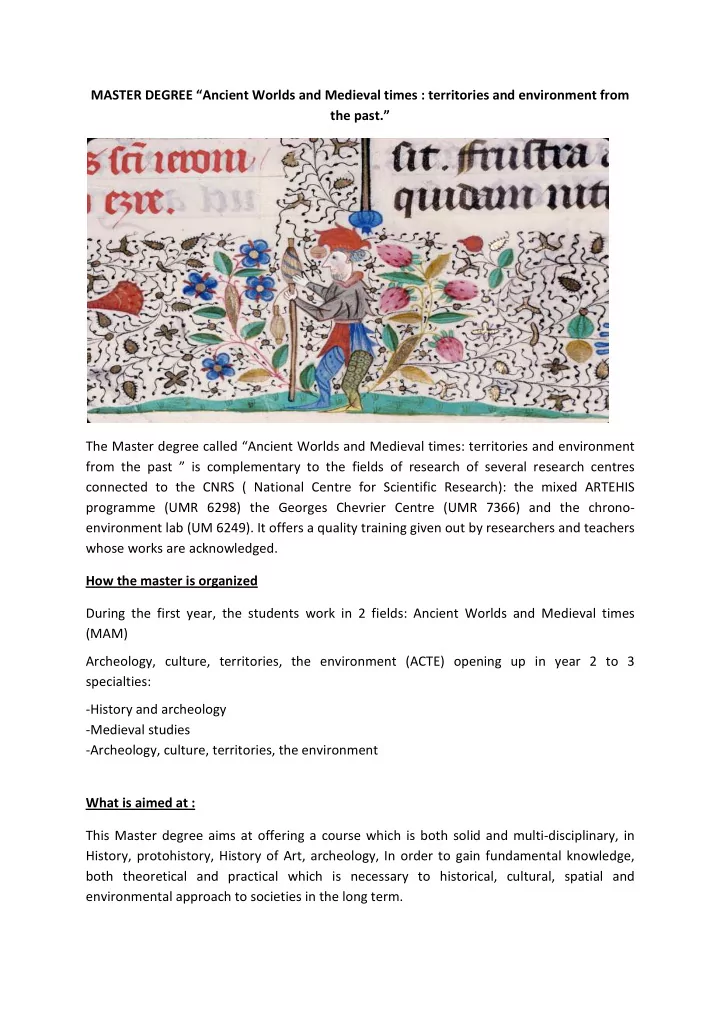

MASTER DEGREE “Ancient Worlds and Medieval times : territories and environment from the past.” The Master degree called “Ancient Worlds and Medieval times: territories and environment from the past ” is complementary to the fields of research of several research centres connected to the CNRS ( National Centre for Scientific Research): the mixed ARTEHIS programme (UMR 6298) the Georges Chevrier Centre (UMR 7366) and the chrono- environment lab (UM 6249). It offers a quality training given out by researchers and teachers whose works are acknowledged. How the master is organized During the first year, the students work in 2 fields: Ancient Worlds and Medieval times (MAM) Archeology, culture, territories, the environment (ACTE) opening up in year 2 to 3 specialties: -History and archeology -Medieval studies -Archeology, culture, territories, the environment What is aimed at : This Master degree aims at offering a course which is both solid and multi-disciplinary, in History, protohistory, History of Art, archeology, In order to gain fundamental knowledge, both theoretical and practical which is necessary to historical, cultural, spatial and environmental approach to societies in the long term.
This multi-disciplinary approach aims at helping the students establish connections between texts and objects, images and music, monuments and representations, tools. Each student can tailor his own course with the help of his research supervisor. What are the diploma’s openings ? The master opens up a wide range of jobs, like teaching, research work (History, Art History, paleoenvironment, geoarchaeology, geomatics applied to archeology), conservation work, promoting heritage, tourism. It also enables the students to be prepared to many competitive exams offered in the fields of research or heritage, to work for the CNRS, university, the Ministère de la Culture (The ministry of Culture) or for Collectivités Territoriales (Local authorities) and as well as the private sector (the art market, restauration work, computer programming) As it opens up multi-disciplinary approaches to space and environment this master can offer access to other jobs in territory planning and management of the environment. What abilities will be acquired at the end of the course ? Specialism: “Ancient Worlds and Medieval times” In the field of “Ancient Worlds and Medieval times” the students will have acquired methods and knowledge in research work, reading and source critic based on an historiographical thinking, archeological methods and research work structuring. The core of this training course consists in preparing and writing a dissertation paper, which is the most important step in acquiring techniques for scientific research. A 60-hour training session, which can be taken with an organization or a firm not necessarily aiming at research, offers a first approach to a professional career. In a long-term approach, the whole curriculum has been designed to aim at a Doctor’s training course.
To go further: http://www.u-bourgogne-formation.fr/-Etudes-medievales-R,225-.html http://www.u-bourgogne-formation.fr/-Histoire-et-archeologie-des-mondes,226-.html Specialism : “Archeology, culture, territories, environment…” This specialism is taught with the joint university of Franche-Comté. It aims at enabling the students to master at a higher level all the necessary tools, that is to say : -collecting and processing the field information, archeological, wild life material and anthropological remains. -picture analysis, computer graphics, spatialization and SIG (geographical information device), database and systems of database management with quantitative and qualitative analysis, data statistics : geological, archeological, paleobotanical, fauna and anthropological. -Quantitative and qualitative processing of historical information Preparing and writing a dissertation, which is one of the most important steps in scientific research, is the core of that course. This course helps resorting to: -field schools -Individual training courses in professional situations -how to write a report and how to write a research paper -how to develop speaking abilities (seminars...) -setting up database in specific situations These actions will be all the more effective as each student will be tutored by a professor (from university, CNRS, [National Scientific Research Centre], INRAP, culture, Local authorities…) Such a scheme is offered from the start of the first year in the Master degree to guarantee each student counseling by a research supervisor.
To go further : http://www.u-bourgogne-formation.fr/-Archeologie-cultures-territoires,224-.html Admission : The students must have passed a Bachelor degree (Licence) in History or any other subject compatible with the specialty (geology, geography for example). Teachers in charge of the degree will assess each student’s profile. Students can also apply to the course if they have passed similar degrees or diplomas. In that case each student’s profile will be examined by a professor in charge of the course. To go further : http://www.u-bourgogne-formation.fr/-Masters-.html Contacts : Professor in charge of the Master degree: Bruno Lemesle Bruno.Lemesle@u-bourgogne.fr Office : Université de Bourgogne, UFR des Sciences Humaines 2, bvd Gabriel 21000 Dijon – France te : 0033+ 380395617
Recommend
More recommend